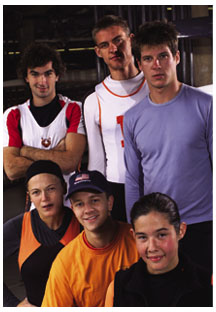
 November
6, 2002:
On
the Campus
November
6, 2002:
On
the Campus
Itching
to play
New seven-week
rule irks student-athletes
By Kristin Roper ’03
Photo: Opposing new restrictions are many student-athletes, including members of Princeton crew, back row from left, Brian McKenna ’04, John Cranston ’03, and John Wachter ’04, and front, Sasha Suda ’03, Jack Land ’03, and Laurie Dean ’03. (Ricardo Barros)
Beginning this fall, Ivy League sports teams must schedule a mandatory off-period during the academic year. This rule, passed at the June meeting of the Council of Ivy Group Presidents, specifies that during the seven-week rest period there will be “no required athletic activities” and “no coaching supervision of voluntary conditioning or other athletic activities.” The decision, intended to give student-athletes more time for academics and other extracurriculars, has generated controversy among certain teams, especially crew, which has a long season and is hard-pressed to schedule the time off.
Originally the Ivy presidents asked the athletic directors to submit a proposal for a 10-week rest period. The athletic directors believed it would be difficult to implement such a long period, says Jeff Orleans, executive director of the council, and recommended a shorter time. The Ivy Policy Deans’ Committee then suggested seven weeks to accommodate both the presidents’ intentions and the directors’ concerns. The seven-week rule applied to all sports teams until mid-October, when it was modified for the crew teams, which now will only be required to take off 33 days in view of their unique calendars. It is a compromise, but student-athletes remain dissatisfied with the change. And part of the problem is the very idea that a rest period is needed at all.
Sasha Suda ’03, captain of the women’s openweight crew, passed up scholarships to several Division I schools and chose Princeton because of its balance between academics and athletics. “I think they’re taking away my freedom to choose how I spend my time. I’m a student first and foremost, but I’m also a student-athlete. I’ve been responsible and successful in both parts of my life, and it feels like student-athletes are being targeted and discriminated against,” Suda says.
President Tilghman supports the idea of making more hours available for athletes to participate in other areas of the university community. “There was ample evidence of a growing disconnect nationally between academic goals and expectations for student-athletes. The Ivy League is in a privileged spot in reference to this trend because we expect that our student-athletes are students first and athletes second. Still, we are not unaffected by these national trends,” says Tilghman.
Curtis Jordan, men’s heavyweight crew coach, has not seen the intensification of athletics during his career at Princeton. “I’ve been here 20 years, and I don’t think the athlete today is more or less motivated than in 1980. The kid they accept here is very competitive and dedicated, and any successful Ivy League coach understands the academic rigor of a place like Princeton,” Jordan says.
Jordan understands the good intentions behind the rule, but asks, “If their academic performance meets the standards set out by the institution, why target athletes?” He adds, “Generally speaking, I’m concerned about the constant identification of students as athletes as a problem, as a negative thing.”
Now, the one challenge will be how to resolve logistical glitches and ensure fair enforcement. Cornell, for instance, typically begins its school year well before Princeton does. The Cornell crew could take 33 days off at the beginning of the season and start practice on roughly the same day as Princeton normally would.
Tilghman says she is “continuing to pay close attention to how this is implemented at Princeton and across the Ivy League.”
The rule will most affect teams when they compete against non-Ivy schools. “I’m sure that non-Ivy schools all over North America are cheering. At scholarship schools, there’s a lot more at stake. On paper the Ivies are at a disadvantage because there’s only so much magic you can make happen; tradition can take you only so far when you’re not allowed to practice,” Suda says.
Tilghman expressed confidence in Princeton’s teams. “The Ivy League has always been disadvantaged relative to the NCAA if you look at metrics across the board: number of hours of practice per week, number of hours of practice out of season, the use of scholarships. Nonetheless, through extraordinary coaching, we continue to win, and we will continue to do so under these regulations,” Tilghman says.
Some student-athletes are organizing to protest. Ivy League rowers at
last month’s Head of the Charles in Boston planned to wear black
shirts with a crossed-out number seven on the back as a show of solidarity.
![]()
Kristin Roper ’03 is an art and archaeology major from Alpine, New Jersey.
ON THE CAMPUS ONLINE: Melissa Renny ’02 takes a look at options in the outside world for this year’s seniors.
